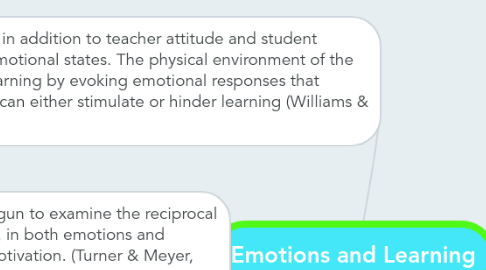Emotions and Learning
by Shelby Buchanan

1. One of the socio-emotional programs that has data supported success is called 'Responsive teaching'. Schools that have implemented responsive teaching with fidelity have seen increased scores within the classroom and on standardized tests (Zubrrycki, 2012).
1.1. Responsive teaching falls on the teacher and is not direct instruction of social and emotional skills. Instead the teacher modifies language and emotion to model how students can respond appropriately in academic situations.
2. Social experiences in classrooms of younger grades influence the decisions students make regarding high school and college (Turner & Meyer, 2008, p. 125).
2.1. Students that have positive experiences in elementary classes are more likely to succeed in high school and enroll in more challenging coursework. These students are also more likely to continue their education past high school graduation.
3. Researchers have begun to examine the reciprocal possibility that affect, in both emotions and moods, influences motivation. (Turner & Meyer, 2008, p. 126).
3.1. Students that experience positive emotions in class are more likely to be self-motivated to learn. An internal motivation to learn, rather than an external motivation (be them positive or negative), will result in greater gains in learning.
4. Classroom environment, in addition to teacher attitude and student experience, can affect emotional states. The physical environment of the classroom can impact learning by evoking emotional responses that influence behaviors that can either stimulate or hinder learning (Williams & Kemp, 2014, p.7).
4.1. Teachers can manipulate their classrooms to evoke positive emotions. Seating charts can make a huge difference in a student's perception of the class and, therefore, their motivation to work. Music and classroom décor can also stimulate positive or negative emotions that impact learning.
5. There is a strong connection between academics and social and emotional skills. Empathy, perspective-taking, self-management, self-awareness, and cooperation can enhance a student's academic success (Laird, 2015, p.57).
5.1. Increased support regarding the association between socio-emotional ability and the academic success have led many schools to implement curriculum for social and emotional skills alongside academic curriculum.


